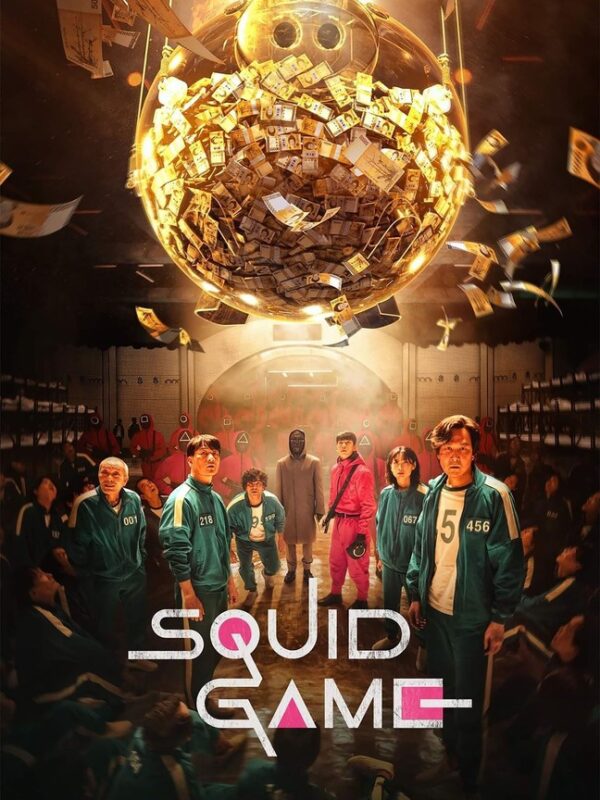I look at “Squid Game” and see the failings of our own economy, as well as lessons on what we could do to create more wealth for all.
By now you’ve probably either watched Squid Game, the hit series on Netflix from South Korea, or you’ve heard people talking about it.

For me, I’m less interested in the show itself than I am about the commentary. Clearly, this show is hitting a nerve, and it’s hitting a nerve in all sorts of interesting ways, specifically about money and personal finance.
And as it’s rare that a show mixes personal finance and, well, death, I think it’s certainly worth going into, isn’t it?
Because it’s hard to escape the idea that we are all living in a Squid Game economy now.
(Spoiler alert: There are no spoilers in this post.)

Table of Contents
What is Squid Game?
Squid Game is a TV series on Netflix where financially-beleaguered ordinary citizens are compelled to participate in a series of children’s-style games in order to win a large financial prize.
The snag is that out of the hundreds of people who participate, only one of them will win the approximately $38 million. Everyone else will die.
The name of the show is taken from a children’s game in Korea called “Squid” which resembles an elaborate game of tag, and where the playing field resembles a squid.
To say that this show is a hit ins an understatement. It is Netflix’s most popular show ever, being beamed into over 100 million households.
But while I’m sure many people are drawn in by the story, and many others are drawn in by the gore (it’s incredibly, almost comically violent), I’m most interested in this because of the social commentary it can offer.
TV shows you’d never see in Norway
I remember a meme going around a few years back when Breaking Bad was all the rage.
In that show, you may recall, a man is given a terminal cancer diagnosis and resorts to a drug dealing in order to secure his family’s financial future.
The premise of the show, I’m sure, was baffling to those who live in other countries with a more humane social safety net.
And so these memes started circulating. Like this one:

The joke was that this show was unrealistic. You have terminal cancer? That’s what nationalized health care is for. There’s no benefit to the country for you to die because you don’t have enough money to pay for treatment.
But then, this is the United States, where we shame the poor and coddle the rich. (Aww, poor billionaires, we can’t tax them more because then they’ll be upset.)
I wonder what the response to Breaking Bad was in South Korea, because it sure seems like they would have understood. Because Squid Game, the show, presents a premise that is as American as apple pie and racism.
Desperation for profit
All of the contestants in Squid Game are on the run from creditors in a big way. All of them are desperate. After all, why else would they continue to subject themselves to likely death in the pursuit of a giant windfall? (Or rather, why else would that premise be believable to a wide audience?)
I hope that no one reading this is on the verge of financial catastrophe, but I bet most of you know what it’s like to feel financial anxiety, to worry that the walls are closing in, that you aren’t going to be able to pay your bills, or that your debts are spiraling out of control.
We can argue whether this is intentional by the “powers that be” or whether this is just a byproduct of unfettered capitalism. I always tend to believe in systemic forces over anything that smacks of a “shadowy cabal”.
Instead, it is decisions (tax rates, etc.) that have caused more money to be transferred into the of the wealthy and less into everyone else’s. In short, the rich have gotten richer, and everyone else has pretty much stayed the same.(Remember that it was only a few decades ago when the highest marginal tax rate in the U.S. was 70%.)
Fighting each other instead of working together
In response to this economic stagnation for most of us, we have two options:
- Collectivize and fight for change. If you think that any economic wins have happened without fighting for them, well, go back to watching Squid Game.
- Fight each other and try to become rich ourselves. This is the idea of the “temporarily embarrassed millionaires” that I’ve talked about before (and even made a video about). We tacitly accept the situation as it is, and try to become one of those top one-percenters ourselves. And if that means stepping over everyone else, well, you should have worked harder, suckers.
What we all could do with $39 million
On Squid Game, there are 456 players at the onset. The prize is 45.6 billion won, or $39 million.
If we divided that money up between each of those players, that would be 100 million won or about $85,000.
Now, which would make more sense from a societal perspective: one person getting all the money, or everyone getting $85,000?
Clearly, dividing the pot up amongst everyone is the right answer here.
But that isn’t the narrative in our society. We want to get rich, get that money, get it for ourselves, with no thought about anyone else. We want to be those millionaires.
And it seems to me that we can have it one of two ways: either we have a very small amount of extremely wealthy people with everyone else failing and stagnating, or we can have a society where the vast majority of people are comfortable and reasonably well off.
The latter would be better for everyone, but it wouldn’t make as good TV.
How to stop the game
How could we achieve this nirvana where we aren’t worried about being able to afford food, or losing our homes?
Well, we could start by incentivizing wealth to be redistributed more equitably. I mean, do billionaires really need to exist? At what point is that money just not being as optimally used in our society? After all, hoarding money doesn’t do anything positive for our economy. Quite the opposite.
(This may sound like socialism, but also sounds like past U.S. history, just not in most of our lifetimes. We used to do this, and we could again.)
But more than that, we need a shift in mindset, from “how can I get the most money” to “how can we all make the most money“. We’ll make less, but all of us will gain more.
And then, when someone asks us to play a game where you flip paper tiles for $100, you can tell them to kindly 꺼져.



One Comment
Justin Sheehy
Great perspective Mike! I believe you’ve hit the nail on the head in terms of the crux of the situation. Though we are unlikely to reach that nirvana in our lifetimes, we are glad to be working with you to, at least, achieve lasting peace with our finances!